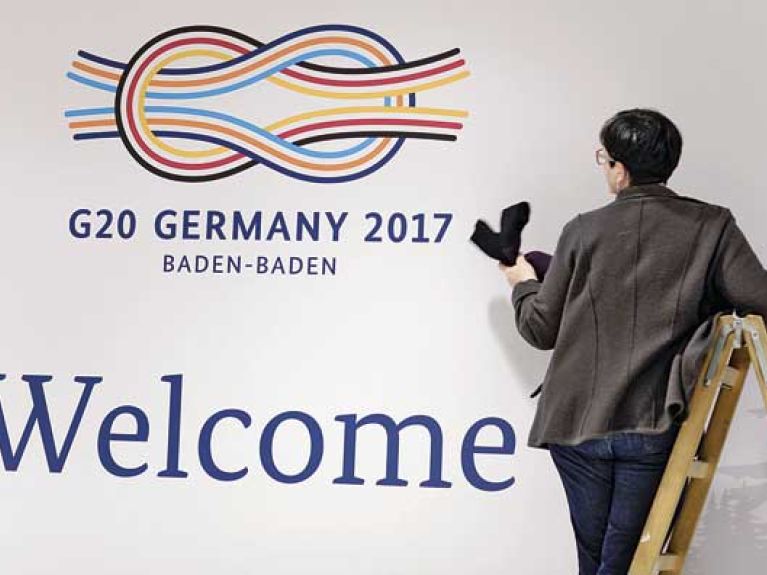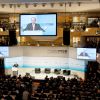Shaping an interconnected world
Building resilience, improving sustainability and assuming responsibility are the goals of the German G20 Presidency for the summit in Hamburg.

On 7 and 8 July 2017, Hamburg will be spotlighted on news channels, news websites and newspapers all over the world: in reports and articles we will see the Elbphilharmonie, the city’s spectacular new landmark, with lots of flags and familiar faces from the world of international politics. On these two days, Hamburg, a traditionally open and cosmopolitan city thanks to its long history as a port and trading centre, will host the summit meeting of the heads of state and government of the Group of Twenty (G20) leading industrialised and emerging economies. Germany holds the G20 Presidency in 2017 and has invited the summit participants to the Hanseatic City under the motto “Shaping an interconnected world”.
US President Donald Trump will visit Germany for the first time to attend the gathering. Also new to the group of G20 summit participants are France’s President Emmanuel Macron and South Korea’s new head of state, Moon Jae-in. However, when the summit meets in Hamburg with a total of over 30 delegations, roughly 4,000 journalists and a large contingent of security personnel, a major part of the work of the G20 Presidency will already have been done: since Germany took over the Presidency from China at the end of 2016, numerous working-level consultations have taken place between ministries and ministers from the G20 countries. In addition, Federal Chancellor Angela Merkel has met with representatives of civil society, which is explicitly meant to participate in addressing global challenges.
Today, however, globalisation continues to meet “with fierce opposition”, says Professor Amrita Narlikar, President of the GIGA German Institute of Global and Area Studies in Hamburg. She believes this is reflected in the anti-free trade policy of President Trump, the Brexit referendum and the growth of rightwing populist movements. Criticism of globalisation will also be expressed by activists and civil society groups before and after the summit – peaceful, but vociferous protests were announced long ago. Nevertheless, Narlikar considers the G20 the best forum for renegotiating globalisation. The economic data leave the expert in no doubt: “Overall, globalisation has led to growth and prosperity in all countries,” she says, adding that de-globalisation is a reliable recipe for the decline of national prosperity. Narlikar believes the German G20 Presidency faces “a challenging task”.
The summit agenda covers the major topics facing the global community: it focuses on current issues of the world economy and world trade, as well as questions of employment, financial markets and the international financial architecture. Following the outbreak of the global financial crisis in 2008, the G20 played an important role in stabilising economies and financial markets. A decade later, there is still a need to overcome the remaining discernible effects of the crisis and to work on the resilience of the global financial system – even if the situation of the world economy has meanwhile improved.
At its twelfth summit, however, the G20 is no longer only focusing on the economy and finance, as it did when it was founded in 2008/2009. After all, in a globalised world, everything is interconnected with everything else. Climate change and energy, the realisation of the Agenda 2030 for Sustainable Development, digitalisation, health and the empowerment of women are thus as equally important issues for the G20 as combating the causes of migration, the fight against terrorism and efforts against corruption. Although the decisions of the G20 are not binding, they can have a major political impact.
The Federal Government now wants to transfer initiatives that it launched during its successful 2015 G7 Presidency at Schloss Elmau in Bavaria to the larger G20 forum: for example, the G7 initiatives for sustainable global supply chains, improved international preparation for health risks and the global fight against antimicrobial resistance. The German Presidency attaches great significance to further intensifying partnership with Africa. The framework conditions for sustainable private investment and investments in infrastructure and renewable energies are to be strengthened with interested African partner countries, who have also been invited to Hamburg. This initiative is also intended to have an impact on other areas of society – such as reducing the risks resulting from climate change and a stronger role for women.
The Federal Government is placing special emphasis on three goals during its Presidency: “Building resilience. Improving sustainability. Assuming responsibility.” That sounds promising – we will soon be able to see live and worldwide how the German G20 Presidency succeeds it taking these goals forward. //

